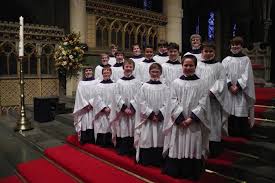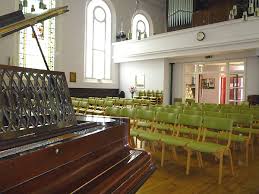St Clement’s Church, Hastings Saturday 5th July 2014
Much eager anticipation surrounded this visit of the Canterbury Choristers to Hastings, as it had been necessary to book them two years in advance. We ourselves were excited as our appetite had been whetted by recently hearing them sing at evensong in the Cathedral. The audience arrived early and soon filled the church to capacity. Our own pew included an immaculately behaved dog who had come to hear his young master sing!
The choir caught our attention immediately with Henry Purcell’s fanfare Sound the Trumpet, and they delighted us to the last note of their recital. In a varied programme spanning five centuries, they treated us to items that were familiar and much loved – Rutter’s For the Beauty of the Earth, and Vivaldi’s Laudamus te – and others less familiar like the ethereal Wonder by Anthony Piccolo. We enjoyed Howard Goodall’s Love Divine and The Lord is my Shepherd, and an exciting and intricate arrangement of Cy Coleman’s The Rhythm of Life. We were privileged to hear works composed by two previous Canterbury choirmasters – Timothy Noon’s Evocation to a Friend, and Bryan Kelly’s Jamaican Magnificat – which as David Flood pointed out, we would never hear again unless we bought the CD!
We were told how sought after was the opportunity to sing the solos. The four young people chosen for this performance – one of whom was celebrating his birthday! – richly deserved the honour. Two solos played by David Newsholme demonstrated the potential of the church’s new organ, and gave the choristers a well deserved break.
The evening was over all too soon. The choristers’ soaring voices had filled the church, and had moved and inspired us all by their conviction and their evident delight in their task. Their commitment and enthusiasm were apparent when talking to some of them before the concert started. Father Robert in his Vote of Thanks confessed that he was rarely lost for words, but was on this occasion. We all echoed his sentiment that these young people were making the very most of a very special opportunity, and that they left Hastings with our warmest wishes for their future success. CE & VG


